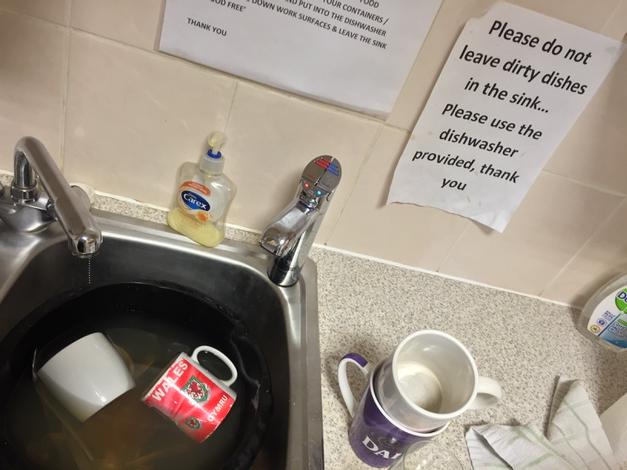
HR Files allows managers to ask questions that will be answered directly by our CEO, Darcy Swift. This month we discuss how to handle Employee Kitchen Nightmares…
QUESTION: Our office kitchen is a complete disaster. Despite repeated talks in our meetings, email reminders, notes in the breakroom; my employees refuse to clean up after themselves. The microwave, refrigerator and even the tables are always disgusting. When I try to address the mess, the conversation turns into someone’s lunch being stolen or this employee left their food in the microwave so nobody could use it, etc.
They are a great team but this constant conversation is a nightmare. We can’t close the breakroom because company policy is that employees can’t eat at their desks where clients can see them. I’m not sure how to resolve this issue. It’s not just one person, it’s everyone. Where do I even start?
ANSWER: You will want to start with respect and professionalism. In your next meeting, ask your employees if they feel like they are professional in the workplace. Ask if they respect each other and themselves. Have your employees give examples of what it is to be professional and respectful.
Once everyone is on the same page about professionalism and respect, let them know that this carries over into EVERY aspect of the job, including the kitchen. Not cleaning up after themselves is a lack of respect for their co-workers and for themselves. It also shows a lack of appreciation for the facility that has been provided for them.
In order to remedy the situation long term, add some accountability and incentive for your employees. You can do this by putting a rotating schedule on the refrigerator assigning an employee to an end of the day task with an incentive if it’s completed. These can be things like cleaning off the tables, making sure dishes are in the dishwasher, picking up trash, etc. Each employee will have a different task each week so nobody is stuck with the bulk of the work. Once they are held accountable, they are more likely to clean up after themselves. Especially if there is an end of the week incentive or reward.
If you have a question you want answered, please CONTACT US HERE. We will feature one frequently asked question a month.

HR Files allows managers to ask questions that will be answered directly by our CEO, Darcy Swift. This month we discuss how to handle Employee Kitchen Nightmares…
QUESTION: Our office kitchen is a complete disaster. Despite repeated talks in our meetings, email reminders, notes in the breakroom; my employees refuse to clean up after themselves. The microwave, refrigerator and even the tables are always disgusting. When I try to address the mess, the conversation turns into someone’s lunch being stolen or this employee left their food in the microwave so nobody could use it, etc.
They are a great team but this constant conversation is a nightmare. We can’t close the breakroom because company policy is that employees can’t eat at their desks where clients can see them. I’m not sure how to resolve this issue. It’s not just one person, it’s everyone. Where do I even start?
ANSWER: You will want to start with respect and professionalism. In your next meeting, ask your employees if they feel like they are professional in the workplace. Ask if they respect each other and themselves. Have your employees give examples of what it is to be professional and respectful.
Once everyone is on the same page about professionalism and respect, let them know that this carries over into EVERY aspect of the job, including the kitchen. Not cleaning up after themselves is a lack of respect for their co-workers and for themselves. It also shows a lack of appreciation for the facility that has been provided for them.
In order to remedy the situation long term, add some accountability and incentive for your employees. You can do this by putting a rotating schedule on the refrigerator assigning an employee to an end of the day task with an incentive if it’s completed. These can be things like cleaning off the tables, making sure dishes are in the dishwasher, picking up trash, etc. Each employee will have a different task each week so nobody is stuck with the bulk of the work. Once they are held accountable, they are more likely to clean up after themselves. Especially if there is an end of the week incentive or reward.
If you have a question you want answered, please CONTACT US HERE. We will feature one frequently asked question a month.



